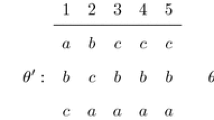Abstract
We interpret solution rules on a class of simple allocation problems as data on the choices of a policy maker. We analyze conditions under which the policy maker’s choices are (i) rational (ii) transitive-rational, and (iii) representable; that is, they coincide with maximization of a (i) binary relation, (ii) transitive binary relation, and (iii) numerical function on the allocation space. Our main results are as follows: (i) a well-known property, contraction independence (a.k.a. IIA) is equivalent to rationality; (ii) every contraction independent and other-c monotonic rule is transitive-rational; and (iii) every contraction independent and other-c monotonic rule, if additionally continuous, can be represented by a numerical function.
Similar content being viewed by others
References
Arrow K. J. (1959) Rational choice functions and orderings. Economica 26: 121–127
Barberà S., Jackson M., Neme A. (1997) Strategy-proof allotment rules. Games and Economic Behavior 18: 1–21
Bénassy J. P. (1993) Nonclearing markets: Microeconomic concepts and macroeconomic applications. Journal of Economic Literature 31: 732–761
Bossert W. (1994) Rational choice and two person bargaining solutions. Journal of Mathematical Economics 23: 549–563
Bossert W., Sprumont Y. (2009) Non-deteriorating choice. Economica 76(302): 337–363
Bossert W., Peters H. (2009) Single-peaked choice. Economic Theory 41: 213–230
Cachon G., Lariviere M. (1999) Capacity choice and allocation: Strategic behavior and supply chain performance. Management Science 45: 1091–1108
Chun Y., Thomson W. (1992) Bargaining problems with claims. Mathematical Social Sciences 24: 19–33
Debreu G. (1954) Representation of a preference ordering by a numerical function. In: Thrall R. M., Coombs C. H., Davis R. L. (eds) Decision processes. Wiley, New York
Edgeworth F. Y. (1898) The pure theory of taxation. In: Musgrave R. A., Peacock A. T. (eds) (1958) Classics in the theory of public finance. Macmillan, New York
Gale D. (1960) A note on revealed preference. Economica 27: 348–354
Hansson B. (1968) Choice structures and preference relations. Synthese 18: 443–458
Houthakker H. S. (1950) Revealed preference and the utility function. Economica 17: 159–174
Kıbrıs, Ö. (2003) Constrained allocation problems with single-peaked preferences: An axiomatic analysis. Social Choice and Welfare 20(3): 353–362
Kıbrıs Ö., Küçükşenel S. (2008) Uniform trade rules for uncleared markets. Social Choice and Welfare 32: 101–121
Kihlstrom R., Mas-Colell A., Sonnenschein H. F. (1976) The demand theory of the weak axiom of revealed preference. Econometrica 44: 971–978
Kim T. (1987) Intransitive indifference and revealed preference. Econometrica 55: 95–115
Masatlioglu Y., Ok E. (2005) Rational choice with status-quo bias. Journal of Economic Theory 115: 1–29
Moulin H. (1985) Egalitarianism and utilitarianism in quasi-linear bargaining. Econometrica 53: 49–67
Nash J. F. (1950) The bargaining problem. Econometrica 18: 155–162
O’Neill B. (1982) A problem of rights arbitration from the Talmud. Mathematical Social Sciences 2: 287–301
Ok E., Zhou L. (2000) The Choquet bargaining solutions. Games and Economic Behavior 33: 249–264
Peters H., Wakker P. (1991) Independence of irrelevant alternatives and revealed group preferences. Econometrica 59: 1787–1801
Peters H., Wakker P. (1994) WARP does not imply SARP for more than two commodities. Journal of Economic Theory 62: 152–160
Richter M. K. (1966) Revealed preference theory. Econometrica 34: 635–645
Rose H. (1958) Consistency of preference: The two-commodity case. Review of Economic Studies 25: 124–125
Rubinstein A., Salant Y. (2006) A model of choice from lists. Theoretical Economics 1: 3–17
Rubinstein A., Salant Y. (2008) (A,f), Choice with frames. Review of Economic Studies 75(4): 1287–1296
Samuelson P. A. (1938) A note on the pure theory of consumer’s behavior. Economica 5: 61–71
Samuelson P. A. (1948) Consumption theory in terms of revealed preferences. Economica 15: 243–253
Sánchez, M. C. (2000). Rationality of bargaining solutions, Journal of Mathematical Economics, 389–399.
Sen A. K. (1971) Choice functions and revealed preferences. Review of Economic Studies 38: 307–317
Shafer W.J. (1977) Revealed preference and aggregation. Econometrica 45(5): 1173–1182
Sondermann D. (1982) Revealed preference: An elementary treatment. Econometrica 50(3): 777–779
Sprumont Y. (1991) The division problem with single-peaked preferences: A characterization of the uniform allocation rule. Econometrica 49: 509–519
Y. (2007) Revealed incomplete preferences under status-quo bias. Mathematical Social Sciences 53: 274–283
Thomson W. (1997) The replacement principle in private good economies with single-peaked preferences. Journal of Economic Theory 76(1): 145–168
Thomson W. (2003) Axiomatic and game-theoretic analysis of bankruptcy and taxation problems: A survey. Mathematical Social Sciences 45: 249–297
Thomson, W. (2007). How to divide when there isn’t enough: From the Talmud to game theory (unpublished manuscript).
Ville J. (1946) Sur les Conditions d’Existence d’Une Ophélimité Totale d’Un Indice du Niveau des Prix. Annales de l’Université de Lyon, Se A(3): 32–39
Young P. (1987) On dividing an amount according to individual claims or liabilities. Mathematics of Operations Research 12: 398–414
Author information
Authors and Affiliations
Corresponding author
Rights and permissions
About this article
Cite this article
Kıbrıs, Ö. A revealed preference analysis of solutions to simple allocation problems. Theory Decis 72, 509–523 (2012). https://doi.org/10.1007/s11238-011-9273-4
Published:
Issue Date:
DOI: https://doi.org/10.1007/s11238-011-9273-4
Keywords
- Rational
- Contraction independence
- Weak axiom of revealed preference
- Strong axiom of revealed preference
- Continuity
- Monotonicity




